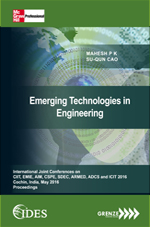An Secured and Energy Conserved Utilization Path Algorithm using Secret Key and Adaptive Partition Controller in WSN
Conference: Sixth International Conference on Computational Intelligence and Information Technology
AbstractIn wireless sensor networks (WSNs), secured and energy conserved data gathering are two important performance metrics for critical event monitoring in wireless sensor networks. Current state-of-the-art research is limited to either maximizing security under redundant radix-based approach or security through adversary model while satisfying throughput requirement. Although many prior research efforts resulted in optimized solutions, but how to optimize both objectives simultaneously has to be addressed. Our proposal work aimed on presenting an integrated configuration called Secret Key and Adaptive partition controller (SK-APC) is to maximize the fastness of data gathering of sensed data in the sink. To focus on secure data gathering of sensed data events, the encryption and decryption of sensor data is simplified using Keyed Hash Function. We show that the solution to the integrated configuration problem characterizes the secured energy conserved data gathering through XORing operations. Next, an Adaptive partition controller based on minimum Steiner tree is presented with the objective of reducing the energy consumption of sensed data gathering at the sink. By applying the minimum Steiner tree, minimum hops between source and sink nodes are identified satisfying the energy conservation principal. An extensive simulation analysis to demonstrate the security aspect and energy conservation principal with time taken for data gathering is presented. The obtained results show that SK-APC provides comparatively better performance than the state-of-the-art works in terms of both security and energy efficiency. Experimental analysis shows that SK-APC is able to reduce the time for data gathering by 25.72% and energy consumption by 18.48% compared to the state-of-the-art works. |
CIIT - 2016
|
